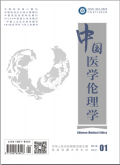中国医学伦理学2024,Vol.37Issue(2):131-137,7.DOI:10.12026/j.issn.1001-8565.2024.02.02
传染病防控中的知情同意:走向一种新的范式
Informed consent in epidemic prevention and control is moving towards a new paradigm
摘要
Abstract
Informed consent is an important medical ethical principle,which has been widely applied in clinical treatment and medical research.However,it is not fully applicable in epidemic prevention and control.The public characteristics of the technical means and governance measures of epidemic prevention and control have led to the lack of some elements of informed consent or changes in ethical standards.The principle of informed consent plays an important role in safeguarding individual rights and interests,therefore its practical value can't be ignored.One of the solutions is to redefine the connotation and practice path of informed consent,including emphasizing the combination of group-informed and individual-informed in the informed process,as well as grasping the boundaries of autonomy,and clarifying the way and scope of legal consent in the process of consent,so as to construct a paradigm of informed consent principles applicable to epidemic prevention and control work.关键词
知情同意/自主权/公共卫生/传染病防控Key words
informed consent/autonomy/public health/epidemic prevention and control分类
医药卫生引用本文复制引用
刘月树..传染病防控中的知情同意:走向一种新的范式[J].中国医学伦理学,2024,37(2):131-137,7.基金项目
国家社科基金项目"我国重大疫情防控《伦理指南》的建构问题研究"(21BZX117) (21BZX117)

